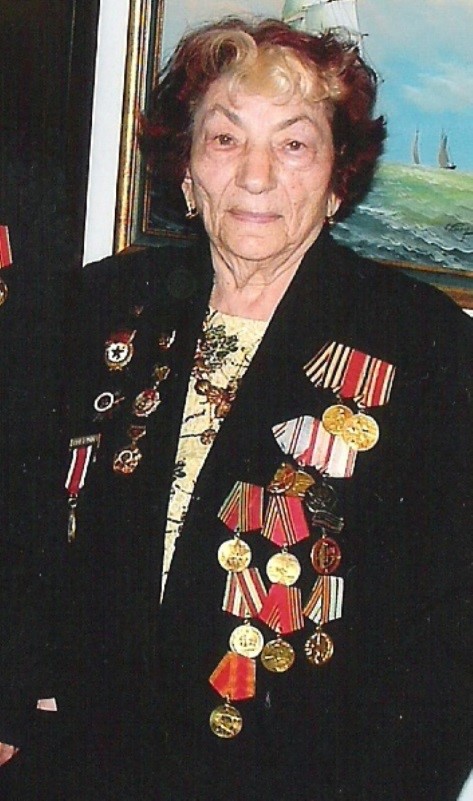Klara Levina (Tikhonovich) was born in 1923 in Gomel, Belorussia, the fifth of seven children. Her brother Khaim (1907-1942), a Yiddish poet, lived in Birobidzhan in the 1930s, moving to Leningrad (present-day St. Petersburg, Russia) at the end of that decade. Her father Sholom Levin, a veteran Communist, named her "Klara" in honor of the renowned German Communist and feminist leader Clara Zetkin. In 1937, during the Stalinist purges, Sholom was arrested. He was released only in 1941, a few months before the German attack on the Soviet Union, as an ailing and broken man. In June-July 1941, as the Wehrmacht was closing in on Gomel, he was reluctant to leave, and it took a great deal of persuasion on the part of his children to get him going. The family was evacuated to Kazakhstan, and Klara was drafted into the "labor front".
In 1942, Klara Levina volunteered for the Red Army, and was sent to a course for commanders. She could have continued her training and become an officer, but she wanted to take part in combat as soon as possible – and so, shortly thereafter, having received the rank of sergeant, she was attached to the 574th Separate Anti-Aircraft Regiment. Her "baptism of fire" took place in September 1943, near Smolensk, western Russia. Later, she fought in Belorussia, Poland, and East Prussia. She was decorated with medals.
Klara's two brothers, Khaim and Aron, fell in the war. Her eldest sister, Lena, died from typhus in the Soviet rear.
Klara Levina seems to have had no clear Jewish motivation for her personal war against Nazism. Thus, in an essay of memoirs prepared for the "Lost Childhood" website, she complained that, during the war, her mother had sent her a letter in Yiddish, which she ostensibly could neither read nor speak [http://www.lost-childhood.com/shkola-vyzhivaniya/152-klara-tikhonovich] – this despite the fact that the family spoke Yiddish. Rather, Klara's decision to fight in the war was motivated by the perception of the war as a universal calamity that threatened everyone, and by the feminist desire to prove that female soldiers could be just as capable as male ones. Notably, Klara Tikhonovich was one of the approximately 200 women interviewed by the Nobel Prize-winning author Svetlana Alexievich for her book The Unwomanly Face of War: An Oral History of Women in World War II (first published in 1985).
After the war, Klara Tikhonovich lived in Minsk. She moved to Israel in 1995. Klara Tikhonovich died in 2015.







